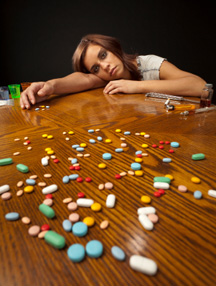Prescription Drug Abuse Treatment Options
Prescribed medications, while intended as remedies, can bring on unintended effects that happen without a person’s even knowing. Sedatives, anti-anxiety medications and pain-relief drugs all carry a potential risk for abuse and addiction. Prescription drug abuse can happen when following doctor’s guidelines as well as when taken for recreational purposes.
With so many different types of medications on the market, prescription drug abuse effects can vary from medication to medication. Likewise, prescription drug abuse treatment options vary according to the type of drug involved. The level of care a person needs must also be considered as any one person’s treatment needs depends on how long, how much and how often he or she uses.
Prescription Drug Abuse Effects

Treatment can help you stop using prescription drugs!
Prescription drugs that carry the potential for abuse and addiction tend to have unintended psychoactive effects, according to the National Institute on Drug Abuse. Psychoactive effects involve mind-altering properties that offset neurotransmitter chemical processes in the brain. Whether a person takes a prescription as prescribed, takes more than prescribed or takes a prescription drug for recreational purposes, psychoactive effects will still result.
Different types of prescription drugs bring on different types of psychoactive effects.
- Central nervous system depressants, such as benzodiazepines and barbiturates slow down brain chemical processes
- Pain relief medications, such as Vicodin and Percocet also slow down brain chemical processes
- Central nervous system stimulants, such as Concerta and Adderall speed up brain chemical process
Treatment options for prescription drug abuse use two primary approaches: medication therapies and behavioral therapies. Medication therapies enable a person to wean off prescription drug use, while behavioral therapies help a person learn new coping behaviors for dealing with everyday living. While medication therapies can only be used to treat certain types of prescription drug abuse, behavioral counseling approaches are used in the treatment of all types of prescription drug abuse.
Medication Therapies
As with any form of addiction, drug cravings and withdrawals effects are the driving forces behind prescription drug abuse. According to the Mayo Clinic, medcation therapies for prescription drug abuse help reduce drug cravings while at the same time relieve withdrawal effects.
Medication therapies exist for treating addictions to opioids and central nervous system depressants. A few of the medications used include:
- Buprenorphine
- Methadone
- Naloxone
As of yet, no medication therapies have been developed to treat addictions involving stimulant medications. Treatment programs can however prescribe medications to treat specific withdrawal symptoms, such as fatigue, depression and insomnia.
Levels of Treatment
For the most part, the severity of a person’s addiction determines which level of treatment will best meet his or her treatment needs. Most people will start with detox treatment as no real progress can be made until the physical dependency issue is eliminated.
After detox, prescription drug abuse treatment options include residential, outpatient and aftercare services. Unless a person still has work and/or family obligations to meet, residential treatment care should be the next step in the recovery process.
People entering treatment at the early stages of addiction may be able to enter outpatient care after completing detox and still receive needed treatment care. Aftercare services, such as ongoing psychotherapy, group counseling and regular 12-step support group meetings should also be considered as a means for maintaining abstinence for the long-term.
 Recognizing the Signs of Vicodin Abuse -
Vicodin is a powerful painkiller with potentially harmful effects when abused. Learning the signs of Vicodin abuse will help you keep your loved ones on track.
Recognizing the Signs of Vicodin Abuse -
Vicodin is a powerful painkiller with potentially harmful effects when abused. Learning the signs of Vicodin abuse will help you keep your loved ones on track.  Is My Opium Abuse Out of Control? -
Opium addiction can happen rather quickly, so it's important to learn the warning signs and when to seek treatment help.
Is My Opium Abuse Out of Control? -
Opium addiction can happen rather quickly, so it's important to learn the warning signs and when to seek treatment help.  What is Opiate Tolerance? -
Whether an individual is prescribed opiates or is taking them illegally, the potential for opiate tolerance exists. Tolerance happens when your body gets so used to the drugs it needs more to feel their effects.
What is Opiate Tolerance? -
Whether an individual is prescribed opiates or is taking them illegally, the potential for opiate tolerance exists. Tolerance happens when your body gets so used to the drugs it needs more to feel their effects.  Prescription Drug Abuse Signs & Symptoms -
As the rate of addiction to prescription pills increases nation-wide, knowing the signs and symptoms of prescription drug abuse becomes increasingly important.
Prescription Drug Abuse Signs & Symptoms -
As the rate of addiction to prescription pills increases nation-wide, knowing the signs and symptoms of prescription drug abuse becomes increasingly important.  Can Opium Abuse Lead to Heroin Use? -
When an opium abuser can't access their drug of choice any longer, for one reason or another, they will often resort to heroin.
Can Opium Abuse Lead to Heroin Use? -
When an opium abuser can't access their drug of choice any longer, for one reason or another, they will often resort to heroin.